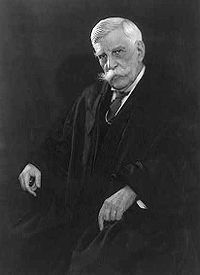- Marketplace of ideas
-
The "marketplace of ideas" is a rationale for freedom of expression based on an analogy to the economic concept of a free market. The "marketplace of ideas" belief holds that the truth or the best policy arises out of the competition of widely various ideas in free, transparent public discourse, an important part of liberal democracy. This concept is often applied to discussions of patent law as well as freedom of the press and the responsibilities of the media. More recently the term has come into use by educators in higher education who have linked the concept to academic freedom.
The phrase "marketplace of ideas" was coined by William Brennan, of the Supreme Court of the United States, in his concurring opinion to Lamont v. Postmaster General, 381 U.S. 301, 308 (1965). But Richard Hofstadter and Walter Metzger (1955) suggest that the concept has ancient roots. The Socratic Method can be seen as the pedagogical embodiment of the "marketplace of ideas."
The concept also has roots in John Milton's argument for freedom of expression. Milton argued that the individual is capable of using reason and distinguishing right from wrong, good from bad. But in order to be able to exercise this reason correctly, the individual must have unlimited access to the ideas of his fellow men in "a free and open encounter." In Milton's writings can be found the idea that when people argue against each other the better argument will prevail.
In the modern era, John Stuart Mill (On Liberty, 1859) and Thomas Jefferson, provided their own explications of the "marketplace of ideas," without using that phrase. Referring to the University of Virginia, Jefferson said, "This institution will be based upon the illimitable freedom of the human mind. For here we are not afraid to follow truth wherever it may lead, nor to tolerate any error so long as reason is left free to combat it" (Letter, Jefferson to William Roscoe, 1820).
In 1813, as part of a correspondence with Isaac McPherson, Thomas Jefferson wrote on the issues confronting patent law: "That ideas should freely spread from one to another over the globe, for the moral and mutual instruction of man, and improvement of his condition, seems to have been peculiarly and benevolently designed by nature, when she made them, like fire, expansible over all space, without lessening their density at any point, and like the air in which we breathe, move, and have our physical being, incapable of confinement, or exclusive appropriation."[1]
Jefferson, who was highly scrutinized by the press, also said: "The basis of our governments being the opinion of the people, the very first object should be to keep that right; and were it left to me to decide whether we should have a government without newspapers or newspapers without a government, I should not hesitate a moment to prefer the latter. But I should mean that every man should receive those papers and be capable of reading them." –Thomas Jefferson to Edward Carrington, 1787. ME 6:57.[2]
The concept of the "marketplace of ideas" is often attributed to Justice Oliver Wendell Holmes Jr.'s dissenting opinion in Abrams v. United States, 250 U.S. 616 (1919). Interestingly, while Justice Holmes (1919) implied the idea in his dissenting opinion, he never used the term. Holmes (1919) stated:
“ Persecution for the expression of opinions seems to me perfectly logical. If you have no doubt of your premises or your power and want a certain result with all your heart you naturally express your wishes in law and sweep away all opposition...But when men have realized that time has upset many fighting faiths, they may come to believe even more than they believe the very foundations of their own conduct that the ultimate good desired is better reached by free trade in ideas...that the best test of truth is the power of the thought to get itself accepted in the competition of the market, and that truth is the only ground upon which their wishes safely can be carried out. That at any rate is the theory of our Constitution.[3] ” After Justice Brennan coined the phrase "marketplace of ideas" in his concurrence to Lamont v. Postmaster General in 1965, the term appeared again in the 1967 U.S. Supreme Court decision Keyishian v. Board of Regents, in which the Court stated: "The classroom is peculiarly the 'marketplace of ideas.'"[4]
Fredrick Siebert glosses the notion of the marketplace of ideas in Four Theories of the Press: "Let all with something to say be free to express themselves. The true and sound will survive. The false and unsound will be vanquished. Government should keep out of the battle and not weigh the odds in favor of one side or the other."[5]
The idea of a "marketplace of ideas" has also been applied to the study of scientific research as a social institution.
Makau Mutua argues in Facilitating Freedom of Religion or Belief, A Deskbook that the idea of the marketplace of ideas as applied to religion "incorrectly assumes a level playing field" among religions.[6]
See also
Notes
- ^ Marketplace of Ideas or Tag Sale?, Steven Johnson, The Nation, November 29, 2001 http://www.thenation.com/doc/20011217/johnson
- ^ Thomas Jefferson on Politics & Government- Freedom of the Press: http://etext.virginia.edu/jefferson/quotations/jeff1600.htm
- ^ Krotoszynski, Ronald J. (2006). The First Amendment in cross-cultural perspective: a comparative legal analysis of the freedom of speech. NYU Press. p. 14. ISBN 9780814747872. http://books.google.com/books?id=uVbdzq6fyDcC&pg=PT30&dq=Marketplace+of+ideas#v=onepage&q=Marketplace%20of%20ideas&f=false.
- ^ Keyishian v. Board of Regents, 385 U.S. 589, 605-606 (1967).
- ^ Siebert, Fred S. "The Libertarian Theory" in Fred S. Siebert, Theodore Peterson, and Wilbur Schramm's Four Theories of the Press: The Authoritarian, Libertarian, Social Responsibility, and Soviet Communist Concepts of What the Press Should Be and Do, p. 45. Chicago: U of Illinois P. http://books.google.com/books?id=4Q-oePDdcC8C&pg=PA45&lpg=PA45&dq=siebert+%22true+and+sound%22&source=bl&ots=F20MjjnSpZ&sig=7yvt6AILK4WtDh9aSTKF8iMjaLw&hl=en&ei=UShsTJKDMoP7lwedorDyAQ&sa=X&oi=book_result&ct=result&resnum=1&ved=0CBIQ6AEwAA#v=onepage&q=true%20and%20sound&f=false
- ^ http://www.manushi-india.org/pdfs_issues/PDF%20Files%20150/Sankrant%20Sanu.%204-12.pdf
Categories:- Freedom of expression
- Idiom
- Philosophical phrases
Wikimedia Foundation. 2010.

